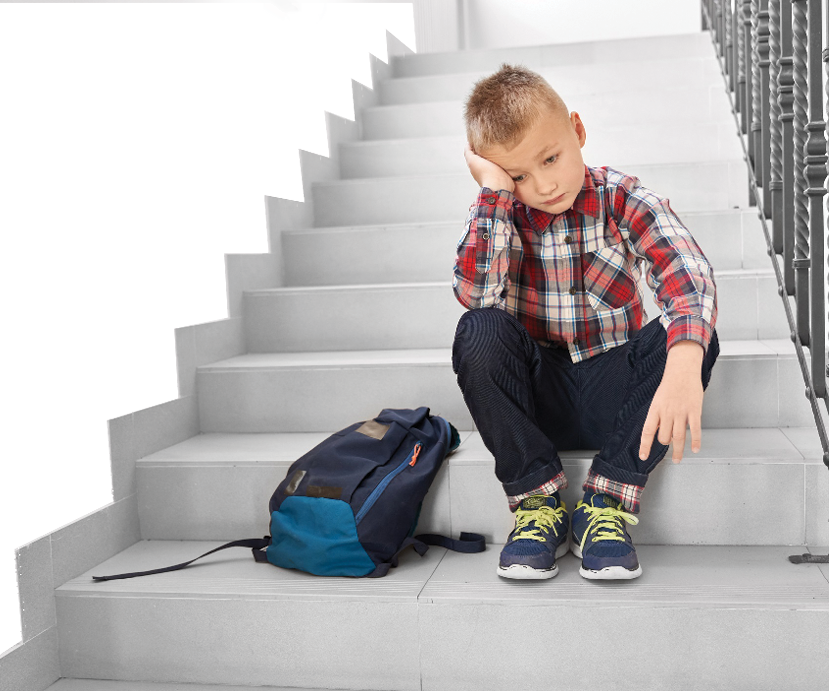Back-to-school anxiety
How to Ease Your Kids Into a New School Year
By Shannon Dean

Whether your kids see it as the long-anticipated continuation of their social life or as an unwelcome interruption to the unstructured days of summer, a new school year is imminent, will likely require adjustments for your family, and could elicit anxiety in your children. Here's how to ease your family into the new school year.
Understand That A New School Year Can Cause Stress
Even kids who've been eagerly counting the days until summer’s end may get clingy or disruptive a few days before the bus arrives. To get a feel of what your child may be experiencing, remember how you’ve felt when beginning a new job: You were using the same skills and felt competent in your past performance but were in an entirely foreign environment with a new boss and colleagues. Your child may feel a similar uncertainty. Although she generally knows what to expect, she can’t be sure how her new teacher will run the classroom, how hard her new assignments will be, or if she’ll click with her new classmates. Psychologist Bela Chopp says school anxiety is common and is "often the result of concerns or about change, fitting in, or school competency.”
Ease Fears By Offering Soothing Routines
Experts assure parents that no matter how much kids protest, routines comfort them: “Children thrive on a routine if it leaves room for personal creativity and is not too rigid,” explains Sharon Hills-Bonczyk, the director of a family resource center. Experts suggest beginning to integrate the back-to-school routine at least two weeks before the first day of school. Begin going to bed and waking 10 minutes earlier than usual until your child is back on schedule. Julie Graham, a licensed clinical social worker, suggests keeping morning sequences simple and repetitive. A child who dresses, eats and grabs his backpack in the same order every day, will eventually automatically function smoothly. Work with your child to choose clothes, load backpacks and pack lunches the night before to keep mornings stress-free.
Make a conscious effort to keep your child’s extracurricular schedule simple as well. The start of school is a good time to prevent over-scheduling yourself and your children. Some experts suggest that parents limit extracurricular activities to two per child.
Know That Many Kids Fret About Fitting In
Kids can worry about appearing confused or out of place. You can help your student by gathering enough information to offer an accurate idea of what to expect. Visit the school and the classroom, meet your child’s teacher, and make sure your child has walked his daily schedule several times. Show smaller children where they can find the bathroom, and help them identify a “buddy” on whom they can depend if they need help. If your older child has to navigate several classes, tape his schedule and locker combination inside of a folder or add it to the notes section of his phone. Many experts agree that the end of summer is a great time to throw a party for class and bus mates to generate enthusiasm.
The desire to fit in is perhaps the biggest cause of back-to-school anxiety. Regardless of age, most kids’ self-esteem is somewhat affected by the degree to which they feel accepted by their peer group. That means they may want to dress or act like their friends, even though this can be difficult for parents. That’s why many experts recommend allowing children some leeway in choosing their own appropriate clothing and accessories.
Address Stress Associated With School Performance
Students may worry that they’ll struggle to handle this year’s academic requirements. Psychologist Susana Chang recommends that parents pull out old school work and report cards or offer grade-level educational worksheets and websites – anything which reassures your child of his ability to meet academic expectations. Tell your child that because you’re aware of her abilities and past performance, you are certain she can handle anything expected of her. Assure her that if she has any difficulty, you’ll ensure she gets any help she needs. And, take care that any anxiety is coming from your child – and not from you. Parents sometimes unintentionally project their own anxieties onto students. Model confidence and an upbeat attitude and your child will likely follow.
Prepare To Offer Extra Support
For the first few weeks, be on the lookout for any suspect behavior – clinginess, avoidance of things your child once enjoyed, or behavior that is not typical. Try to clear your calendar and be available to talk about any concerns your child may have. Ask specific questions about his experiences and follow up with fun, low-key family activities to relieve stress. Don’t hesitate to speak to your child’s teacher or school if your child experiences any problems. Dr. Joan Goodman, a professor of education, says that parents wrongly worry that if they bring up their child's difficulties, "the teacher will have negative and low expectations" of their child. This is well-intentioned but wrong, she says. Teachers do not yet have direct knowledge of your child and need your input. Although experts say most children will be able to fully adjust to school within a few weeks or at most a month, Mark Reuben, M.D., suggests that parents should investigate when a child dislikes or refuses to go to school. Often, he says, a student is being bullied or having difficulties with classmates. If parents and school administrators can't resolve the situation, he suggests parents consult the child's physician.
There’s no doubt the first day of school can bring many adjustments and anxieties for the entire family. But by making a conscious effort to establish comforting routines and open communication, you can addresses concerns and give your children a feeling of competency and control so that they’ll willingly welcome the fall.









